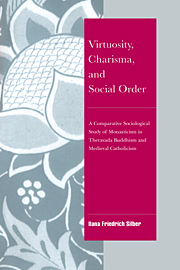 Virtuosity, Charisma and Social Order
Virtuosity, Charisma and Social Order Published online by Cambridge University Press: 09 October 2009
Christian asceticism is thought to have started with the practice of various forms of supererogatory self-denial within the framework of ordinary family life. It is only gradually that ascetic ideals became intimately associated with the idea of total sexual abstinence and permanent separation from social life. A pattern of withdrawal to the desert or the mountains, however, is recorded as early as the third century in Egypt and Syria, reaching the West (at first Italy and Gaul) only around the fourth century. Significantly for our present purposes, this desert tradition already stamped Christian monasticism with one of its most fundamental ambiguities. Whether as the domain of wild animals and demons, or at the extreme opposite, as the paradisiac place of encounter with God, the desert represented the anti-city and anti-civilization. However, under the impact of monasticism it was also quickly transformed, as conveyed in what has become a locus classicus of monastic literature – the Life of Saint Anthony – into a “city” of sorts. The desert came to constitute, in fact, “a ‘counter-world,’ a place where an alternative ‘city’ could grow.”
Even at this stage, in what appears to have been a very fluid milieu where eremitic, semieremitic, and fully cenobitic forms of life coexisted, ascetic life could assume a highly structured, quasi-military character, as in the densely populated monasteries founded in the Egyptian Thebaid by Pachomius in the first half of the fourth century.
To save this book to your Kindle, first ensure [email protected] is added to your Approved Personal Document E-mail List under your Personal Document Settings on the Manage Your Content and Devices page of your Amazon account. Then enter the ‘name’ part of your Kindle email address below. Find out more about saving to your Kindle.
Note you can select to save to either the @free.kindle.com or @kindle.com variations. ‘@free.kindle.com’ emails are free but can only be saved to your device when it is connected to wi-fi. ‘@kindle.com’ emails can be delivered even when you are not connected to wi-fi, but note that service fees apply.
Find out more about the Kindle Personal Document Service.
To save content items to your account, please confirm that you agree to abide by our usage policies. If this is the first time you use this feature, you will be asked to authorise Cambridge Core to connect with your account. Find out more about saving content to Dropbox.
To save content items to your account, please confirm that you agree to abide by our usage policies. If this is the first time you use this feature, you will be asked to authorise Cambridge Core to connect with your account. Find out more about saving content to Google Drive.